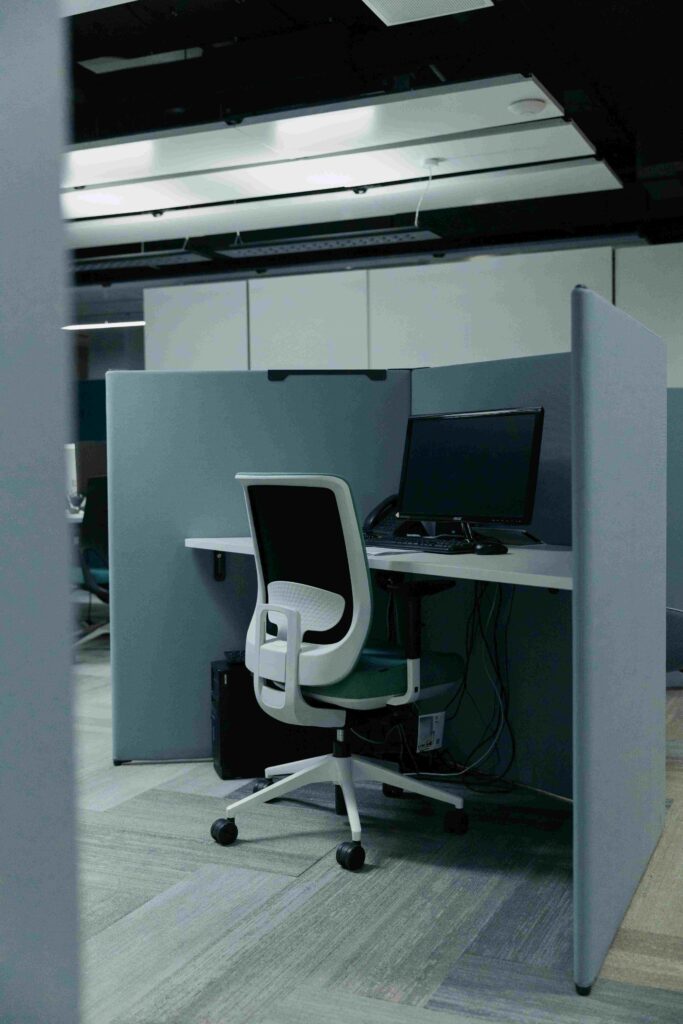Corporate America: The Hidden Realities of Loneliness, Absurdity and Cruelty
Author’s Memo
In my short story, “Cubicle,” a student filmmaker discovers loneliness, absurdity, and cruelty in the halls of Corporate America—but also finds his artistic voice. The story was inspired by the documentary, “Primate,” which shows the hubris of scientists, made by the filmmaker Frederick Wiseman. I wrote this story after watching “Primate” and thought, “What if a filmmaker studied Corporate America like an anthropologist?” With a background in science, I’ve often felt like I have a scholarly or scientific approach to writing fiction, and even memoir, almost approaching material like a case study, much like Gideon Kundalini did in his book, “Engineering Culture,” which explored the intricate dynamics and practices that shape the cultural aspects of organizations in the technology and engineering sectors.
‘In my short story, “Cubicle,” a student filmmaker discovers loneliness, absurdity, and cruelty in the halls of Corporate America—but also finds his artistic voice.

Cubicle
By the end of my second year of film school, I was still struggling to find my voice as an aspiring documentary filmmaker. Most of my classmates had already committed to an artistic style, and some had even begun film projects. They used many of the techniques we’d learned in class: on-camera interviews, voice-over narration, reenactments using actors or animation, and dramatic music intended to emphasize certain moments.
Perhaps I was a purist, but I considered such methods nothing more than parlor tricks. They cluttered up films and sometimes obscured the truth. Most of my peers considered themselves journalists, but my aims were novelistic. To make a film with all the subtleties and complexities of fiction. I wanted my film to raise questions, not just provide answers. To show what I’d observed in as simple terms as possible.
Yet no subject had ignited my passions. What did I want to highlight and show the world?
That summer, I interned part-time with the marketing department of Boston Health, editing videos that featured physicians and scientists talking about diseases and patients who had undergone successful treatments. A few weeks in, Kathy, the marketing content manager, called me into her office.
‘Most of my peers considered themselves journalists, but my aims were novelistic.
“Due to recent staff increases, we need more space,” she told me. “We’ll be assembling a dozen cubicles to make sure everyone has seating. How would you feel about working in one of the new workspaces?”
I hadn’t worked in a traditional office setting before the internship, and I had never even heard of a “cubicle farm.” I had seen a cubicle, though. Such a tiny space offered no natural light and seemed like a dreadful place to spend eight hours a day. Despite the question, though, something in Kathy’s expression gave me the sense I didn’t really have a choice in the matter. She’d already made her decision.
‘Perhaps I was a purist, but I considered such methods nothing more than parlor tricks.
“Whatever you need,” I replied.
Just as I was exiting her office, an idea struck me, and I turned back to face her.
“As you know, I’ve been hoping to make a film for my school thesis.” When she nodded, I added, “What if I brought my camera into the office to film the assembly of the cubicles?”
She frowned thoughtfully. “I suppose that would be okay, but you’ll need to clear the project through HR.”
After three meetings and signatures on several official documents, my project was approved. The next morning, during the marketing department’s weekly meeting of thirty employees, Kathy announced I would be making a student film about the office.
“Isaac will walk around with a camera,” she declared monotonously. “If he asks questions, please answer them in a respectful manner, but do not disclose confidential information about our department or the hospital.”
I stood. “Thank you for allowing me to observe your work. I’ll do my best to avoid disturbing the environment or anyone. I plan to maintain a fly-on-the-wall approach. I only want to understand what it’s like to work in a modern office setting as the new cubicles are being put together.”
A marketing manager, Hannah, raised her hand, and I pointed at her. “Do you have a question?”
“Will you conduct interviews?” Hannah asked.
I shook my head. “I’d like to avoid on-camera interviews. I’d like to just film you going about your business and capture a story—if one develops.”
She beamed. “How exciting!”
It took about two weeks for the workspaces to be built. The project was anticlimactic and decidedly uncinematic. So much so, I nearly abandoned it until I observed the interactions of employees working within the cubicles.
‘So much so, I nearly abandoned it until I observed the interactions of employees working within the cubicles.
After a few days of gathering footage of the cubicle farm, it was clear most people stayed in one place most of the day, leaving only for lunch or to chat with a coworker in the breakroom or hallway. While one of the building’s exits led to a path that wound through a private park, few folks took advantage of it.
The most surprising aspect, though, was the silence. The drop of a pin would have been clearly heard. To avoid distracting one another, many people chatted via the messaging tool on their computers. Even employees who sat a few feet apart communicated using the digital tool. And the moment someone passed behind them, they minimized the messaging tool as if they’d been caught doing something improper.
‘The most surprising aspect, though, was the silence. … To avoid distracting one another, many people chatted via the messaging tool on their computers.
About a month into filming, I passed the cubicle of a bored-looking man named Jackson. I didn’t know much about the thirty-something other than that he supervised a graphic designer and a copywriter. What made him so uninterested? Was something going on in his work life that I could explore? Curious, I asked his permission to film him.
Jackson shrugged, seeming indifferent to my request. Such apathy seemed to be his general approach to everything. Perhaps it was this too-cool-for-school quality I gravitated toward. Everyone else in the office walked the walk, so to speak, but Jackson seemed to be a free thinker. In an environment where conformity reigned, I sensed an independent thinker like Jackson might attract conflict.
I filmed Jackson for most of the week. Unlike others, who decorated their cubicles with pictures of friends or family, he had left the walls of his cubicle bare. He seemed to prefer the lack of distraction, as he spent hours at a time hunched over a laptop, staring at Excel spreadsheets.
At one point, I asked Jackson to describe his role and the work he did: maintenance of the hospital’s website, making updates and fixing glitches. That week, he was working on a project from Victoria, the department’s vice president. The US News & World Report had ranked Boston Health thirteenth in the United States, dropping it from eighth the year prior.
“Lucky thirteen,” Jackson noted with sarcasm.
I positioned the camera a few feet from his face. “What’s your project?”
“Well, Victoria told Kathy to have me create a list of every place on the hospital’s website where we say we’re eighth and then change it to thirteenth.”
Out of nowhere, a balled-up piece of paper struck Jackson above the ear. I panned the camera toward the source to see his neighbor grinning from her chair. Christmas lights flickered on the walls of her cubicle.
“Your aim’s getting better, Hannah,” Jackson remarked.
“Lunch?” Hannah asked.
Jackson closed his laptop. “I’m starving.”
Hannah looked at me and pointed at the camera. “You want to join?”
I agreed, eager to spend time in a more casual setting. The camera continued rolling as we strolled to the cafeteria, where we paid for our food and found a table. Jackson and Hannah agreed to me filming lunch, though others watched the camera with suspicion. I set the camera on a nearby table, hoping Jackson and Hannah would overlook it and act naturally.
A curious change transpired in Jackson right away. While he’d appeared bored and apathetic in his cubicle, his face brightened as he discussed a trade the New England Patriots had recently made and how it would benefit his fantasy football team. The change in his demeanor was fascinating. When Jackson talked about sports, he seemed so vibrant and full of life, yet he appeared deeply uninterested in his job.
‘While he’d appeared bored and apathetic in his cubicle, his face brightened as he discussed a trade the New England Patriots had recently made …
“Do you like your job?” I asked.
Jackson shrugged. “I don’t hate it. Any line of work comes with all sorts of crap. It’s a job; jobs aren’t supposed to be fun.”
Having spent time with others in the department, I had the vague sense Jackson wasn’t the only one who felt dissatisfied every day, year in, year out. Did they need money that badly? How did such widespread discontent manifest in the department?
The next morning, I strolled the halls with my camera, aiming to get a better sense of the environment in which the employees worked. The office walls were white and mostly blank. It might’ve made sense to display artwork depicting the renowned doctors, nurses, and hospital leaders who’d founded Boston Health and helped it thrive over its long history. It might have reinforced the values of the organization, instilled a sense of mission within the employees, and perhaps helped them find purpose in their work.
Yet most workers seemed to care more about what snacks were offered in the break room—mostly junk food. It seemed fashionable for people to concern themselves with trivialities and ignore big stuff that could help them become better workers.
As I was contemplating the bare walls, I noticed Hannah farther down the hallway, whispering with Claire, the graphic designer Jackson managed. Though Claire kept her voice low, I could just make out what she was saying about me.
“Watch out, ladies and gentlemen. Ken Burns, coming through.”
I frowned at the reference to the famous documentary filmmaker. I greatly admired the man, but it was obvious Claire was poking fun at me. When I got closer, Hannah smiled innocently, as if they’d only been discussing the weather.
I hesitated, wondering if I’d misinterpreted Claire’s comment. “Is there something you’d like to say about my film project, Claire?”
Claire pressed a hand to her chest, looking taken aback. “No, Isaac! We were just saying how much we liked Ken Burns’s new documentary about Paul Farmer.”
“Uh-huh.” Not wanting to press the issue, I smiled and walked away, reminding myself I was a fly on the wall for this project, not part of the story.
The incident made me paranoid, though. Did others have a problem with my project? A few people had told me they didn’t want to be filmed, citing a desire for privacy in their work lives, which I was happy to honor. Some employees even seemed to enjoy being filmed, as if the project might somehow make them celebrities. However, most barely acknowledged my presence.
A few of my classmates thought my project was a waste of time. One was filming graffiti artists in the streets of Somerville. Another was making a film about the oldest poetry bookshop in Harvard Square. They believed they were exploring more compelling topics with more fascinating characters.
While there was nothing wrong with their topics, I tried to explain how interesting my own subject matter was. To hold an audience’s interest, every story needed conflict, and the modern office was chock-full of it. From a cubicle’s claustrophobia and the mind-numbing monotony of assignments to the passive-aggressive behavior, gossiping, and politics that filled the office, most days, I had trouble deciding where to set my camera. Drama everywhere!
Yet I took my classmates’ criticisms to heart. Feeling self-conscious about my project, I visited our professor, Venise. I ran the idea by her, and she asked me for some examples of what I’d been capturing around the office.
I started off with the staff meetings. “It’s a bizarre dynamic where no one speaks up for fear of looking dumb or being seen as not following the rules.”
Venise nodded. “Oh yes, that happens in academia too. Happens everywhere, really, so it’ll be familiar to a broad audience. What else?”
“There’s the office’s break room. Coworkers spend a lot of time there discussing their weekends to avoid getting back to work.”
“It’s a bizarre dynamic where no one speaks up for fear of looking dumb or being seen as not following the rules.”
Venise grinned. “Viewers will relish the subtext.”
“Also, there’s a spot at the edge of the parking lot where these two employees, Hannah and Claire, go to smoke and gossip about their coworkers.”
“All good stuff.” Venise paused thoughtfully. “Is there anything happening on an extra-personal level? To add an additional layer of conflict?”
I searched my mind. “Yeah, my boss, Kathy, said Boston Health isn’t doing well financially. The department will soon undergo restructuring, which is probably the most dramatic event in corporate America. Everyone’s afraid of being laid off, so people are defending their jobs, trying to justify their existence.”
“This sounds like a great project, Isaac. I wouldn’t listen to your classmates. Everyone’s drawn to different topics. As an artist, you have to learn to trust your intuition. You want to make films about subjects you genuinely care about. If you feel drawn to this material . . . well, go make your movie, young man.”
Venise’s words lifted my spirit, and I knew I was committing to the right project, after all. “Hey, do you want to see some of my footage?”
“Absolutely!”
Pulling out my phone, I showed her footage where Victoria and Kathy discussed their plan to “exit” Jackson. I paused the video to describe how people in corporate culture seemed to speak a different language.
“They use terms like stand up, which seems to stand for starting something new; socialize, which means sharing an idea with colleagues; and escalate, which means bringing a perceived problem to superiors. When someone wants to distance themselves from an action that wounds their conscience, they often use a euphemism such as ‘exiting,’ which, in Jackson’s case, means firing him.”
“This will all play well on the screen,” Venise said. “Viewers who don’t know much about corporate culture will feel like they’re witnessing another species of human.”
“The drama doesn’t stop there,” I continued. “Everywhere you look, there are pockets of resentment, such as from the creative professionals, like graphic designers and copywriters, who have too many deadlines, are strained for time, and don’t get recognized by the managers who assign the projects.”
‘When someone wants to distance themselves from an action that wounds their conscience, they often use a euphemism such as ‘exiting,’…
Venise raised her hands to calm me. “All right, Isaac, I get it. It’s wonderful to see a student as passionate as you are. I have to teach in a few minutes, but here’s a pro tip: The style of film you’re aiming for is called direct cinema. You probably won’t know what you really have until you go through all your footage. Finding your story will take a tremendous amount of editing. But the truth should reveal itself as you continue to gather and edit your material.”
“That’s my main insecurity over this project,” I said. “I’m gathering so much material, I’m afraid I won’t be able to separate the wheat from the chaff when it comes time to choose and assemble scenes.”
“Understandably so. An audience won’t want to watch ninety minutes of people sitting in cubicles gossiping and trying to game the hospital ranking system. They want to watch a movie. So create a movie.”
“But how?”
“A movie has a beginning, middle, and end. A documentary should be informative but also entertaining. When you reach the editing stage, find a dramatic structure within the material. It will help you choose and arrange scenes to create an entertaining movie.”
By the time I left Venise’s office, I felt much more comfortable with my chosen project and was eager to dive back in.
As the summer wore on, I continued capturing the subtleties and complexities of working in a modern office setting. I felt like I was observing a new species with strange behaviors and rituals.
Such behaviors included rampant complaining. The toilet flushed too loudly. The ID reader at the office’s entrance didn’t register fast enough. Employees couldn’t park in the lot behind the building. On and on it went.
To perhaps distract themselves from their ennui, many employees occupied themselves with minutiae. They debated over who should water the plants and who should control the playlist during lunch on Music Thursdays—and whether Jackson choosing to play Bob Marley was a form of cultural appropriation.
Most employees finished their work by two or three in the afternoon, sometimes earlier. They couldn’t leave until five, so they busied themselves by surfing the web or chatting. By the end of the workday, they looked exhausted.
It was evident most employees were miserable. Many felt their skills didn’t match their responsibilities or their abilities exceeded the demands of their jobs. Though they earned respectable salaries, their jobs were, in a way, voluntary servitude. On camera, Hannah confessed to being a corporate slave. Jackson admitted to “living in the velvet ghetto,” while his income kept him in “golden handcuffs.”
During staff meetings, I’d often sit in the back of the room to record everything. The employees always spoke cautiously, presumably aware others were listening in.
Before one such meeting began, Claire turned to Hannah. “I heard you had a squabble with a doctor.”
Hannah rolled her eyes. “Yeah. I asked this shoulder surgeon if she wanted to be in our video about the orthopedics department. She sent back a nasty email saying she wanted no part of our propaganda because she had patients to take care of.”
“Yikes,” Claire whispered. “What’d you do?”
“I forwarded the email to HR. Then I sent it to Victoria, who went over the surgeon’s head and contacted the chief of orthopedics to urge the surgeon to participate.”
“I assume the surgeon’s joining now?”
Hannah nodded. “When I met her for an on-camera interview, I wore a short-sleeve shirt that showed the scar from the last surgery on my shoulder.”
Claire raised her eyebrows. “You really showed her.”
Across the table, Jackson frowned at the two women. I wondered if he thought Hannah’s behavior was passive-aggressive or unprofessional.
Just then, Victoria sauntered into the conference room and sat down. She wore a dark-blue business suit and a stern expression. Some of the employees stared at her, waiting for her to begin; others stared at the table and peered at her out of the corners of their eyes. Everyone seemed conscious of the office hierarchy, making sure to be on their best behavior when someone at the top of the organizational chart was in their presence.
“Let’s discuss our new US News & World Report ranking,” Victoria said. “After all we’ve done to influence our ranking, it’s unfortunate we dropped from eighth place to thirteenth. We need to redouble our efforts so Boston Health can be in the top ten again.”
The group discussed several marketing strategies that could boost their ranking. An important initiative, they decided, would be to email more marketing articles to physicians each month.
When I caught sight of Jackson subtly rolling his eyes, I focused my camera on him. From previous footage, I knew he thought the email campaign was a fool’s errand. As far as he was concerned, the hospital was simply spamming doctors with “journalistic-styled” articles containing physician quotes that bragged about Boston Health’s medical services and scientific breakthroughs.
Jackson suspected doctors didn’t respond positively to their emails. “Surely they notice the articles’ clear bias,” he’d said at one point. “If anything, they probably resent Boston Health for buying their email addresses.” If so, the entire campaign might have had the unintended consequence of painting the hospital in a negative light.
From previous conversations, I knew Hannah didn’t see it that way. She’d led various efforts to demystify the US News & World Report’s hospital ranking system to find ways of gaming it for Boston Health’s benefit. She had admitted to me privately that she wasn’t sure they could boost the ranking through marketing efforts, but she thought of herself as “a happy soldier,” doing Victoria’s bidding without objection.
Or as Jackson considered it, without “thinking critically.” He believed the kind of obedience Hannah practiced was repugnant and led to groupthink and bad outcomes.
As far as I was aware, though, he hadn’t voiced such thoughts outside our one-on-one conversations, likely because he was among the minority with such opinions. His objections might be an existential threat to the project, perhaps even to the jobs of people like Victoria and Hannah. Yet it seemed silly to overlook potential flaws in the initiative, as addressing them could improve the outcome.
Watching Jackson through the camera, I wondered if he would express his skepticism during this staff meeting. Every once in a while, he inhaled deeply or bit his lip, seeming to ready himself, but then stopped short. I kept him in frame, waiting for him to say something.
The conversation was wrapping up when Jackson began speaking abruptly. Startled, Victoria twitched in her seat.
“This whole initiative is ridiculous,” he uttered. “Only a small aspect of the hospital ranking process can be influenced by marketers like us. Most of the score is determined by the hospital’s results, not the opinions of other doctors, which is what we’re trying to influence here.”
An eerie silence fell over the room. Apparently, Jackson had committed a faux pas by calling the team’s strategy and hard work into question. No one knew how to respond.
Victoria quickly took back control of the meeting and asked Claire to present her new design for the email template.
‘Instead, she seemed committed to doing anything but engaging in a face-to-face confrontation.
After the meeting, I set my camera up in the break room, hoping to observe the staff reacting to Jackson’s behavior, but everyone just engaged in small talk. Some refilled their coffee or retrieved food from the refrigerator. I wondered if knowing my camera was present affected how they acted. Was their behavior “natural,” or were they putting on an act for the camera? How would I know?
Either way, it probably wouldn’t matter. Even if someone was performing for the camera, they would still be acting the way they thought they ought to behave. In this case, getting coffee and making small talk with coworkers.
Most people forgot about the camera. They came and went, chatting briefly about their family, a hobby, or their plans for the weekend. The weather always seemed to be a hot topic, especially with regard to how it might impact their weekend plans.
I found such conversations boring. When I wasn’t filming, I was usually eager to talk about new projects, like the video we were producing to advertise Boston Health’s same-day knee surgery. I’d interviewed several patients who had raved about their orthopedic surgeons and how satisfying it was to be able to leave the hospital on the same day as having the procedure.
Though I couldn’t put a finger on why, it seemed that talking about one’s enthusiasm for work was also considered a faux pas.
Though I couldn’t put a finger on why, it seemed that talking about one’s enthusiasm for work was also considered a faux pas. People wanted to discuss subjects that helped them escape their duties, and work projects spoiled the fun. If someone wanted to discuss a work matter, it was customary to frame it in the context of a complaint.
Taking a break from filming, I went outside to get some fresh air. As I walked through the parking lot, I spotted Claire and Hannah in the smoking area, chattering excitedly. Knowing they would be gossiping, I ran back inside, grabbed my camera, and approached the women.
“Would you mind if I filmed you?”
Claire flicked ash from the tip of her cigarette. “It’s fine.”
Claire was usually guarded around the office. She was quiet in meetings, seldom sharing ideas or impressions. In private, however, she always bad-mouthed people, though she typically shied away from the camera, so I’d never captured this second identity. Perhaps because the smoking area was a place for gossip, Claire seemed to stop caring that everything was being recorded.
‘In private, however, she always bad-mouthed people, though she typically shied away from the camera, so I’d never captured this second identity.
Claire took a drag on her cigarette. “Jackson is a total boob.”
“Such a bad attitude,” Hannah agreed.
Claire blew out a cloud of smoke. “Did he call me his ‘logo lady’ the other day?”
“Glad you told Victoria. Brave of you, actually.”
“Oh yeah, he’s in hot water right now.”
I didn’t understand why Claire didn’t just express her discontent to Jackson himself and try to reconcile. Instead, she seemed committed to doing anything but engaging in a face-to-face confrontation.
“Victoria’s getting HR involved,” Claire added.
“Good!” Hannah snarled.
I found it ironic that Boston Health’s marketing department was populated by communications experts, yet when conflict arose, they seldom communicated with each other, or if they did, they did so without effective resolutions. Rather, it seemed common practice for employees to weaponize HR against one another.
‘I found it ironic that Boston Health’s marketing department was populated by communications experts, yet when conflict arose, they seldom communicated with each other, or if they did, they did so without effective resolutions.
Claire beamed as she speculated that Jackson might be fired on Monday. Thinking such disciplinary action would be cinematic, I met with someone in HR to ask if I could attend such a meeting to record it. My request was declined, though they did say I could leave my camera in the room.
On Monday, I was determined to follow Jackson, though I was careful not to let on that a storm might be brewing. Curiously, he’d shaved his beard and seemed rather subdued. Did he suspect disciplinary action was coming?
‘Rather, it seemed common practice for employees to weaponize HR against one another.
Around ten, I visited HR to confirm I could film any meetings with Jackson. A middle-aged woman told me a meeting had been planned for before lunch, but she couldn’t disclose any more details, and she swore me to secrecy. Before leaving, I situated my camera in her office, pointing it at the chair across the desk from her. I pressed the record button and left.
I ran back to Jackson’s cubicle, set up another camera I had brought, and waited. Thirty minutes later, Jackson got a phone call that had his face turning white as printer paper.
“What happened?” I inquired.
Jackson’s hand shook. “I was told to report to HR for a check-in with Victoria.”
I followed Jackson, wishing him luck as he entered the woman’s office. The HR professional was sitting behind her desk; Victoria sat across from her beside an empty chair.
I pulled up the video feed on my phone to watch the meeting unfold.
As Jackson closed the door, his eyes darted back and forth in angst.
The HR professional crossed her legs. “Please take a seat.”
Jackson carefully took the empty chair. “Excuse me, am I being fired?”
The HR manager looked surprised by Jackson’s directness. She glanced at Victoria, but the other woman remained silent. “Yes, your employment at Boston Health is no longer secure.”
Jackson’s fingers turned white as his grip on the arms of the chair tightened. He turned to Victoria, his face turning red.
Before he could say anything to her, the HR manager continued. “We’ve had several complaints—”
“Complaints? Who’s complaining?”
“We’re under no obligation to release the names of the staff members who reported you.”
Jackson shook his head, looking dumbfounded.
“Several employees have said they are not comfortable in your presence. It’s our judgment that you’ve created a psychologically unsafe work environment.”
Jackson’s mouth fell open. “So, that’s it? You’re firing me?”
“A security guard will accompany you to your cubicle so you can gather your possessions, but you won’t be allowed to access any files.” Moments later, the security guard arrived and escorted Jackson out of the room.
“A security guard will accompany you to your cubicle so you can gather your possessions, but you won’t be allowed to access any files.” Moments later, the security guard arrived and escorted Jackson out of the room.
Following the pair, I filmed Jackson as he packed a box with office equipment and photographs. The guard then led Jackson to the parking lot. After loading the box into his car, Jackson turned to the office’s windows and gave the middle finger to whoever might be watching. Then he turned to the camera, bowed, got in his car, and drove away.
On the last day of my internship, I met with my manager, Kathy. I was pleased with the work I’d done for the hospital. The video about same-day knee surgery had gotten a few thousand likes on the hospital’s Facebook page.
“We’ve enjoyed having you, Isaac,” Kathy chirped. “And truly, best of luck with your documentary. We can’t wait to see the final product.”
When I exited the building, Hannah was wiping tears from her eyes as she smoked a cigarette.
“It was a pleasure working with you, Hannah,” I said, hoping to console her even as I said goodbye. “And good luck with your work on the US News & World Report.”
“Whatever.” She sniffled. “It doesn’t matter.”
I’d already packed the video gear into my car, but I pulled my cell phone from my coat pocket and motioned to it, indicating I’d like to film our conversation. Hannah nodded and took a drag on her cigarette.
“What do you mean when you say it doesn’t matter?”
“Our work! None of it matters.” She pointed to the building. “Whenever I think about how I spend every day of my life—whenever I think about my place in the world—I want to cry.”
I’d noticed many employees had other careers or side hustles that offered the promise of better, more authentic lives, if only they would follow through. The copywriter brewed his own beer. Claire loved to bake and had always talked about opening a catering business. Even Victoria had made candles and sold them on Etsy.
“Is there anything else you’d rather do than work in marketing?”
“Sometimes I think about changing careers,” Hannah admitted. “I wanted to be a midwife, but I’d have to go back to school. It would take time and money, and I have a mortgage, student loans, and a two-year-old.” She blew smoke in the direction of the office. “Everyone in there did what we were supposed to do. We went to college, got a good job with a good organization, and started climbing the corporate ladder. But it was a hoax. A trap. A life sentence.”
The sadness I felt for her in that moment weighed heavily upon my chest, but all I could do was wish her the best and hope she could find a better quality of life.
As I drove home, one thing stayed at the front of my mind: It was time to start making the documentary. That weekend, I organized the hundreds of hours of footage on my computer. The next Monday, I visited Venise’s office.
“I want to thank you for all the advice you gave me this summer; it really helped. I’ve finished filming, and I’m going to start editing tonight.”
“That’s wonderful,” Venise said. “At this stage, I always encourage students to develop a perspective on their subject matter.”
“What do you mean?”
“What do you think about what you witnessed?” she asked. “How can you portray that without being too heavy-handed?”
‘The sadness I felt for her in that moment weighed heavily upon my chest, but all I could do was wish her the best and hope she could find a better quality of life.
I looked away as I considered the question. “I can’t think of anything right now.”
“That’s totally fine. It’ll come to you. It usually comes to me in a flash just before I get in the editing room.”
Encouraged to forge a perspective on my material, I left the professor’s office and strolled along the Charles River. As I considered my summer at Boston Health, I realized I did have a perspective on the material. corporate America seemed like a soulless environment where people suffered countless indignities. People seldom said what they wanted, and those who tried to speak the truth were despised for their sincerity.
No one got along either. If they hadn’t happened to work together, it was doubtful most of them would have spent five minutes together. No one enjoyed their work, and many were nihilistic about modern work life. And all the soul-crushing qualities of corporate America seemed to me to be embodied by the cubicle.
With that in mind, I decided on a title for my film: Cubicle.
I was so eager to edit the material, I neglected my homework for the entire following semester. It took me four months to finish the film. When I showed Venise the final cut, she was moved by its poignancy. “It’s the best student film I’ve ever seen.”
A week later, she called me back into her office. “I called a friend of mine who owns Somerville Theatre.” She smiled. “Your film will premiere there, Isaac! It’s scheduled to play during the holidays.”
Incredible! I left Venise’s office so energized, I sprinted back to my dorm. That night, I emailed an invitation to come see the film to friends, family, and of course, everyone in the office. It was Boston Health’s movie as much as it was mine.
The night of the debut, I stood at the theater’s entrance and greeted folks as they arrived. I sported a suit jacket I’d bought at a thrift store. I felt like a true filmmaker.
Hannah skipped through the entrance and shook my hand excitedly. “I can’t believe I’m starring in a movie!”
“Easy there, Kim Kardashian,” Claire uttered with her typical sarcasm.
The last to enter the theater, I chose a seat in the center and close to the wall to observe reactions.
‘The last to enter the theater, I chose a seat in the center and close to the wall to observe reactions.
The movie began with an establishing shot of Boston Health. It followed with shots of the marketing department and short vignettes of the staff working silently in their cubicles and mingling in the break room.
After the cubicle farm had been built, the film presented the point of view I’d developed on the subject matter by exposing the absurdity of corporate America: the mindless bureaucracy, passive-aggressive behavior, gossiping, emotional bullying, boredom, groupthink, conformity, and the disconnection—from natural light, from other people, and from themselves.
‘Claire couldn’t look at the screen as it displayed her being quiet in meetings but then gossiping behind everyone’s back.
It quickly became obvious the Boston Health staff didn’t like what they were seeing. Their concerned expressions said it all. They fidgeted in their seats, scowled in disgust, and swiveled their heads with contempt.
Some sank in their seats as they witnessed how they’d behaved. Hannah covered her mouth with one hand as she watched her passive-aggressive behavior toward the shoulder surgeon. Claire couldn’t look at the screen as it displayed her being quiet in meetings but then gossiping behind everyone’s back.
When the movie ended, my friends and family, who had no connection to Boston Health, began clapping. But nobody among the Boston Health group moved. The atmosphere in the theater was heavy. What was this feeling in the air?
‘When the movie ended, my friends and family, who had no connection to Boston Health, began clapping. But nobody among the Boston Health group moved.
Then I knew: shame. Everyone’s behavior in the office had been presented so clearly; they were ashamed over the way they’d acted. Ashamed to be occupying their current place in the world. Ashamed to be who they were.
Until then, it hadn’t occurred to me that my subjects might be angry with how they were represented in the film. I hadn’t been heavy-handed. I hadn’t interviewed scholars to comment on corporate America or gathered confessional interviews from employees to intersperse throughout the scenes to create drama.
‘Until then, it hadn’t occurred to me that my subjects might be angry with how they were represented in the film.
I’d only stitched together real moments from these people’s work lives. I had captured the truth. And now they hated me for it. Perhaps even hated themselves.
Suddenly, Victoria shot out of her seat, daggers in her eyes. She scanned the theater, and when she saw me, she pointed at me. “This is outrageous, Isaac! How dare you paint my team in such a negative light!”
Slowly, I rose from my own seat. “It wasn’t my intention to portray anyone in a bad light. I’m a filmmaker. The artist’s mandate is to tell the truth.”
Before I could say any more, a man I hadn’t seen enter the theater stood, lowered the hood of his sweatshirt, and removed his baseball cap. It was Jackson.
“You did it to yourselves!” he shouted. “If you wanted to be portrayed better, you should’ve acted better.”
Nobody responded to Jackson’s accusation. Instead, the Boston Health workers started leaving their seats, grumbling as they walked the aisles toward the exits. A few glared at me as they passed, but most avoided eye contact, sheepishly staring at the floor.
I wasn’t proud I’d ruffled so many people’s feathers, but I was happy I’d accomplished what I’d set out to do. I’d found a style of documentary filmmaking I loved. I’d discovered a voice of my own. And I couldn’t wait to use my camera to tell more stories. No matter how hard to swallow they might be for those who took part in them.
‘I wasn’t proud I’d ruffled so many people’s feathers, but I was happy I’d accomplished what I’d set out to do.
Credits
Featured photo of Cubicles for Pexels by Tima Miroshnichenko
Photo of a A cubicle for Pexels by Cottonbro-studio
Learn More
New to autoethnography? Visit What Is Autoethnography? How Can I Learn More? to learn about autoethnographic writing and expressive arts. Interested in contributing? Then, view our editorial board’s What Do Editors Look for When Reviewing Evocative Autoethnographic Work?. Accordingly, check out our Submissions page. View Our Team in order to learn about our editorial board. Please see our Work with Us page to learn about volunteering at The AutoEthnographer. Visit Scholarships to learn about our annual student scholarship competition.
Dustin Grinnell is the author of the short story collection, The Healing Book (Finishing Line Press), which was a finalist in the 2023 Best Book Awards and a recommended read from Kirkus Reviews. He’s also the author of The Genius Dilemma, Without Limits, and The Empathy Academy, which was a Distinguished Favorite in the 2023 NYC Big Book Awards. A travel writer, his journeys have been featured as essays in the travel sections of the Boston Globe, the Philadelphia Inquirer, and the Washington Post. He’s won two Solas Awards for Best Travel Writing and an honorable mention from the North American Travel Journalists Association Travel Media Awards Competition. Connect with him at www.dustingrinnell.com












